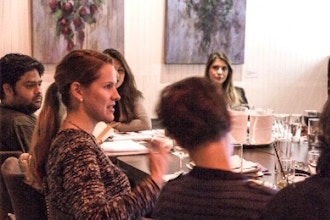Fredric Jameson: What is Postmodernism?
- All levels
- 21 and older
- $315
- Earn 3,150 reward points
- Online Classroom
- 12 hours over 4 sessions
Thankfully we have 6 other Lecture Classes for you to choose from. Check our top choices below or see all classes for more options.
Brooklyn Institute for Social Research @ Online Classroom
Embark on a riveting exploration of trust, deceit, and existential uncertainty in Herman Melville’s masterpiece. Join us as we dissect The Confidence-Man, delving into its satire of capitalist modernity and probing questions of faith, knowledge, and societal norms.
May 5th
2–5pm EDT
Meets 4 Times
Brooklyn Institute for Social Research @ Online Classroom
Delve into the profound intersections of race, class, and capitalism in a thought-provoking exploration of contemporary radical movements. Join us for an in-depth examination of Cedric Robinson’s concept of racial capitalism and its implications for understanding modernity, nationalism, and Black Radicalism.
May 7th
6:30–9:30pm EDT
Meets 4 Times
Brooklyn Institute for Social Research @ Online Classroom
Embark on a captivating exploration of Mesopotamian civilization through archaeology and material culture. Join us as we delve into the origins, structures, and legacy of this ancient society, unraveling its significance amidst historical interpretations and contemporary geopolitical contexts.
May 8th
6:30–9:30pm EDT
Meets 4 Times
Brooklyn Institute for Social Research @ Online Classroom
Uncover the entwined history of psychoanalysis and state power in a captivating exploration of repression tactics. Join us as we delve into the intersections of Freudian theory with military strategy, urban policing, and guerrilla warfare.
May 12th
2–5pm EDT
Meets 4 Times
Brooklyn Institute for Social Research @ Online Classroom
Delve into the complex terrain of pregnancy politics, exploring gestational labor, abortion rights, and reproductive justice. Join us for a deep dive into theoretical frameworks, historical perspectives, and contemporary debates surrounding the manufacture of human fetuses.
May 12th
2–5pm EDT
Meets 4 Times
“The postmodern,” writes Marxist literary and cultural theorist Fredric Jameson, “is the force field in which very different kinds of cultural impulses . . . must make their way.” Adapted from a New Left Review essay of the same name, Jameson’s Postmodernism, or The Cultural Logic of Late Capitalism is an ambitious account of how the postmodern has replaced modernism as the “cultural dominant” of late capitalism. In conversation with figures ranging from György Lukács to George Lucas, Frank Gehry to Paul DeMan, Theodor Adorno to Philip K. Dick, Jameson invites us to consider the cultural symptoms of this transformation: the proliferation of pastiche, the eroded distinction between high culture and low, a visual culture characterized by depthlessness, a pervasive cultural nostalgia and lost sense of historicity. At stake in his diagnosis is a question that still confronts us, perhaps with greater urgency, today: What forms of radical cultural politics, if any, remain open to us when, in the words of one of Jameson’s interlocutors, “capitalism has colonized the dreaming life of the population”?
In this course, we will engage in a close reading of Postmodernism, paired with excerpts from Jameson’s other major writings; theorists with whom Jameson engages, including Marx, Adorno, Walter Benjamin, Manfredo Tafuri, and Jean-François Lyotard; and his more recent interlocutors, such as Sianne Ngai and Mark Fisher. To what extent is Jameson’s account of the constitutive features of postmodernity supported or challenged by our own late capitalist present? What accounts for the enduring appeal of Jameson’s work to contemporary theorists of capitalism’s affective dimensions? More generally, what is at stake in our ability to think historically—to locate ourselves between past and future? What does, and what should, aesthetic experience and cultural criticism do for us?
This course is available for "remote" learning and will be available to anyone with access to an internet device with a microphone (this includes most models of computers, tablets). Classes will take place with a "Live" instructor at the date/times listed below.
Upon registration, the instructor will send along additional information about how to log-on and participate in the class.
In any event where a customer wants to cancel their enrollment and is eligible for a full refund, a 5% processing fee will be deducted from the refund amount.

People who viewed this class also viewed the following classes
Get quick answers from CourseHorse and past students.
The Brooklyn Institute for Social Research was established in 2011 in Boerum Hill, Brooklyn. Its mission is to extend liberal arts education and research far beyond the borders of the traditional university, supporting community education needs and opening up new possibilities for scholarship in the...
Read more about Brooklyn Institute for Social Research

This school has been carefully vetted by CourseHorse and is a verified Online educator.

Booking this class for a group? Find great private group events



More in Life Skills




Get special date and rate options for your group. Submit the form below and we'll get back to you within 2 business hours with pricing and availability.